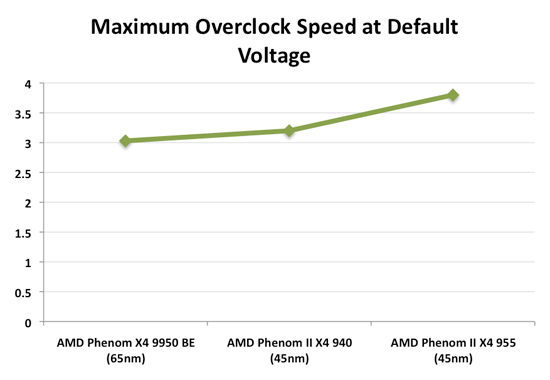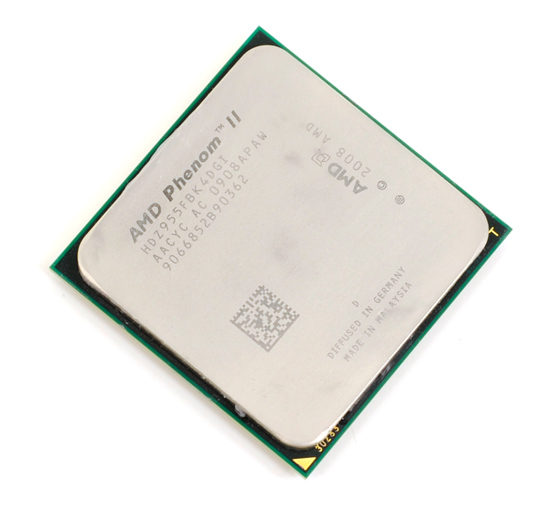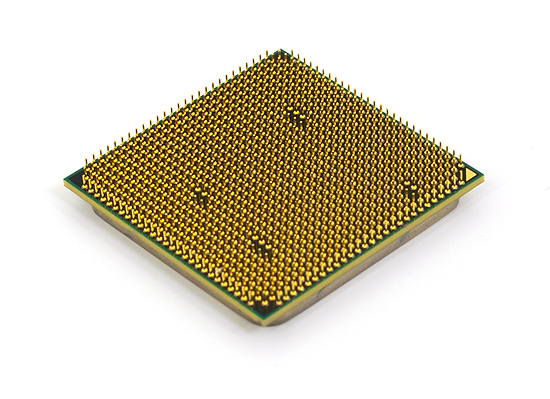AMD's Phenom II X4 955 Black Edition
by Anand Lal Shimpi on April 23, 2009 12:00 AM EST- Posted in
- CPUs
Die size hasn’t changed, clock speeds barely went up, and performance per clock also remained static. But what’s this?

Ah yes, AMD is improving its 45nm manufacturing process and today we have the latest incarnation of AMD’s 45nm silicon.
The first versions of AMD’s 45nm Phenom II couldn’t really go much higher than the final 65nm Phenom without increasing voltage. By comparison, Intel’s Core i7 920 could go from 2.66GHz all the way up to 3.80GHz without so much as a single extra millivolt in our tests.
This new Phenom II however can also hit 3.80GHz without increasing the core voltage. At least that’s what one of our samples did in our testing. Whether it’s 3.8GHz or 3.6GHz, the fact of the matter is that AMD’s 45nm process is improving and that’s what’s behind todays introduction of the Phenom II X4 955. Architecturally the Phenom II hasn't changed; if you're curious about what makes these things tick, please look at our original article on the CPU.


Clocked at 3.2GHz with a 2.0GHz un-core (or North Bridge) frequency, the 955 isn’t that much different from the 940 in terms of clock speed. The two face off in the table below:
| CPU | Clock Speed | un-core Clock (NB Frequency) | Die Size | Transistor Count | TDP | Socket |
| Phenom II X4 955 | 3.2GHz | 2.0GHz | 258 mm2 | 758M | 125W | AM3 or AM2+ |
| Phenom II X4 940 | 3.0GHz | 1.8GHz | 258 mm2 | 758M | 125W | AM2+ |
This is a Socket-AM3 part, meaning it can work in both DDR2 based Socket-AM2+ motherboards and DDR3 based Socket-AM3 motherboards. There’s a huge compatibility caveat about AM2+ support but I’ll address that shortly. The Phenom II X4 955 is also a Black Edition part, meaning it has an unlocked clock multiplier for easy overclocking.

Along with the 955 there’s also a 945 being introduced today. The 945 is identical to the 940 in core clock speed but has a 2.0GHz un-core and is also AM3 compatible.
| Processor | Clock Speed | un-core Clock | L2 Cache | L3 Cache | TDP | Price |
| AMD Phenom II X4 955 BE | 3.2GHz | 2.0GHz | 2MB | 6MB | 125W | $245 |
| AMD Phenom II X4 945 | 3.0GHz | 2.0GHz | 2MB | 6MB | 125W | $225 |
| AMD Phenom II X4 940 BE | 3.0GHz | 1.8GHz | 2MB | 6MB | 125W | $225 |
| AMD Phenom II X4 920 | 2.8GHz | 1.8GHz | 2MB | 6MB | 125W | $195 |
| AMD Phenom II X4 910 | 2.6GHz | 2.0GHz | 2MB | 6MB | 95W | $??? |
| AMD Phenom II X4 810 | 2.6GHz | 2.0GHz | 2MB | 4MB | 95W | $175 |
| AMD Phenom II X4 805 | 2.5GHz | 2.0GHz | 2MB | 4MB | 95W | $??? |
| AMD Phenom II X3 720 BE | 2.8GHz | 2.0GHz | 1.5MB | 6MB | 95W | $145 |
| AMD Phenom II X3 710 | 2.6GHz | 2.0GHz | 1.5MB | 6MB | 95W | $125 |
| AMD Phenom 9950 | 2.6GHz | 2.0GHz | 2MB | 2MB | 140W | $173 |
The prices are pretty attractive; the 955 will sell for $245 (and it already has been) and the 945 will go for $225. That pits the 955 against Intel’s Core 2 Duo Q9550 ($266) and the Core i7-920 ($284), the latter having a much higher motherboard cost of course.
| Processor | Price |
| Intel Core i7-920 (2.66GHz) | $284 |
| Intel Core 2 Quad Q9650 (3.00GHz) | $316 |
| Intel Core 2 Quad Q9550 (2.83GHz) | $266 |
| Intel Core 2 Quad Q9400 (2.66GHz) | $213 |
| Intel Core 2 Quad Q8400 (2.66GHz) | $183 |
| Intel Core 2 Quad Q8300 (2.50GHz) | $183 |
| Intel Core 2 Quad Q8200 (2.33GHz) | $163 |
And you know how I love spoiling surprises so here you have it. Unless you’re running applications that are very well optimized for Intel’s architectures, the Phenom II X4 955 is faster than the Core 2 Quad Q9550. Compared to the Core i7-920, it loses hands down although the chip does come close in some games.
Sorry, I’m not much of a tease :) Now for the rest of the article.










65 Comments
View All Comments
poohbear - Thursday, April 23, 2009 - link
hey, is it safe to conclude that since farcry2 shows a 5% increase going from ddr3 1066 to ddr 3 1333 & another 4% going from ddr 3 1333 to ddr 1600, that overall it'd show a 9% increase switching from ddr1066 to ddr1600? that's quite a leap just based on memory!lopri - Thursday, April 23, 2009 - link
UnfortunatelySadly
Unlikely
Disappointing
Useless
Waste
Unpleasant
Painfully
Negligible
--
Luckily
Thankfully
Great
Possibility
Benefit
impressive
Once again
Surprise
Refreshing
Next up (my guess): SSD or Mac
aguilpa1 - Thursday, April 23, 2009 - link
Unfortunately - at 3.2 it can't keep up with 2.66 i7Sadly - AMD needs new architecture
Unlikely - that it will happen soone
Disappointing - results even though quality is improving
Useless - to keep comparing the lates amd to intel
Waste - of article space for these comparisons
Unpleasant - to AMD fans
Painfully - obvious AMD is far behind
Negligible - improvements with new releases
--
Luckily - there are other articles to read
Thankfully - I don't own one of these chips or mobos
Great - bunch of useless data
Possibility - AMD may pull something actually new of these days
Benefit - of better pricing and competition
impressive - how I'm still finding things to write on this
Once again - I am bored by a Tom's article
Surprise - (sorry no surprises here)
Refreshing - my post has come to an end.
Nfarce - Thursday, April 23, 2009 - link
Hahaha! I'm still waiting on the AMD whiners complaining of Anandtech anti-AMD bias every time Intel whips them.Nfarce - Thursday, April 23, 2009 - link
Oh yeah, and the fact that a stock i7 has Turbo Mode is fair game. AMD needs to produce better than this. They own the mid-range GPU market with excellent cards like the HD 4870, but their processor development just - flat - needs - help.Procurion - Thursday, April 23, 2009 - link
Not an issue-I own both AMD and Intel systems but am considering moving up from my 9950BE to the 955 and want to be sure of what I am buying before I spend my money. Some of us aren't as well versed as others in the finer points and that's what I thought the comments section was for.Procurion - Thursday, April 23, 2009 - link
I can understand some of your comments, but according to his data/listed values, the i7 920 is NOT running at stock speed. The frequency he lists is 2.8, NOT 2.66. What's up with that Anand? I can't see where you mention that your test was run with OC'd cpu's but the speed you list for the i7 920 is overclocked? It does skew the results if that is the case.Procurion - Thursday, April 23, 2009 - link
To clarify, the listed speeds for Sysmark, which would make the i7 part look much better than if you had run it at 2.66. To draw the conclusions at the end of your article without noting the difference(if there is one and it's not a typo) or justifying your conclusion with proper references of performance in 50% of your published tests is confusing to say the least. Can you clarify?Spacecomber - Thursday, April 23, 2009 - link
I'm guessing that he is showing the processor's actual speed during the test. The 2.8GHz speed likely is due to the i7's native ability to overclock itself via Turbo Mode (see page 4 of the article). In other words, the i7-920 dynamically has an actual clock speed up to 2.93GHz, depending on the application(s) running.Anand Lal Shimpi - Thursday, April 23, 2009 - link
woops, sorry for the confusion there, the i7-920 ran at its stock speed of 2.66GHz but Turbo Mode was enabled so it'll run as fast as 2.8GHz when more than one core is active.Take care,
Anand